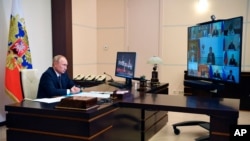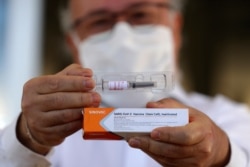Russian President Vladimir Putin says his country has become the first in the world to formally approve a new COVID-19 vaccine, despite a lack of data to back up his claims that the drug is safe to administer to humans.
President Putin announced the development during a meeting with his government ministers Tuesday that was carried live on state television.
"I know that it works quite effectively, it forms a stable immunity,” Putin said of the new vaccine developed by Moscow’s Gamaleya Institute. He said the vaccine had undergone “all the necessary checks” to ensure its safety, adding that his own daughter has been inoculated in an early testing phase. The president said his daughter ran a slight fever on the first day, but her temperature dropped to normal the following day.
Production of the new Russian vaccine -- which has been dubbed Sputnik V, in honor of the world’s first man-made satellite launched by the then-Soviet Union in 1957 -- will begin next month, with mass vaccinations starting as early as October. Russian authorities have said that medical workers, teachers and other risk groups will be the first to be inoculated. Deputy Prime Minister Tatyana Golikova said that the vaccination of doctors could start as early as this month.
The new vaccine is one of more than 100 possible vaccines being developed in a race by governments and biomedical firms to blunt a pandemic that has now sickened more than 20 million people and caused more than 736,000 deaths, according to Johns Hopkins University’s coronavirus tracker.
The Russian vaccine is not among the handful that reached the third and final phase of testing in human trials, which usually involve thousands of people and lasts for months, according to the World Health Organization. Scientists within Russia and abroad have questioned the move to register the vaccine before Phase 3 trials are complete.
Critics say this could prove harmful to patients, and either lead to a false sense of security or undermine trust in vaccinations.
And Russia has also been accused by the United States, Britain and Canada of using hackers to steal vaccine research from labs in their countries.
Putin’s announcement comes as Chinese-based biotech company Sinovac has launched a late-stage human trial of a potential COVID-19 vaccine in Indonesia. The vaccine, dubbed CoronaVac, will be administered to as many as 1,620 volunteers to test its safety and effectiveness. Indonesia is the second nation where Sinovac has launched a late-stage trial.
Sinovac has already launched a late-stage trial of CoronaVac in Brazil, which has more than 3 million confirmed coronavirus infections and 101,752 deaths, placing it second behind the United States in both categories. Indonesia, the world’s fourth-most-populous country, has reported more than 127,000 total cases and 5,765 deaths.
Sinovac may also soon begin late-stage human trials of CoronaVac in Bangladesh. The company is not conducting human tests in China because of the low number of new infections.
Meanwhile, the Trump administration is considering a new set of immigration rules that would bar U.S. citizens and permanent residents from returning from abroad if that person is believed to have been infected with the virus.
The proposal, first reported late Monday by The New York Times, would expand the administration's current rules that ban foreign citizens from entering the U.S., citing the risk of someone from a coronavirus "hot spot" -- a location with an unusually high rate of infections -- coming into the country.
The Times says the proposed rule could particularly impact the border with Mexico, where many American citizens and legal residents cross back and forth on a regular basis. The proposal notes the prevalence of COVID-19 in Mexico as evidence of its necessity, citing the death of the health minister in the border state of Chihuahua earlier this month from the virus.
The Trump administration has moved aggressively to stem the flow of immigration since taking office, especially since the pandemic began. Officials have implemented a program at the border that quickly sends most migrants taken into custody back to Mexico.
The United States leads the world in the number of total coronavirus infections -- nearly 5.1 million -- and deaths, with 163,465, according to the coronavirus tracker established by Johns Hopkins University.
The American Academy of Pediatrics and the Children's Hospital Association have reported a large increase in the number of children sickened by the coronavirus last month.
Nearly 100,000 youngsters became ill in the last two weeks of July.
The coronavirus is relatively mild in children, but they can still pass the virus to older people, including the elderly who are much more susceptible, according to doctors.

